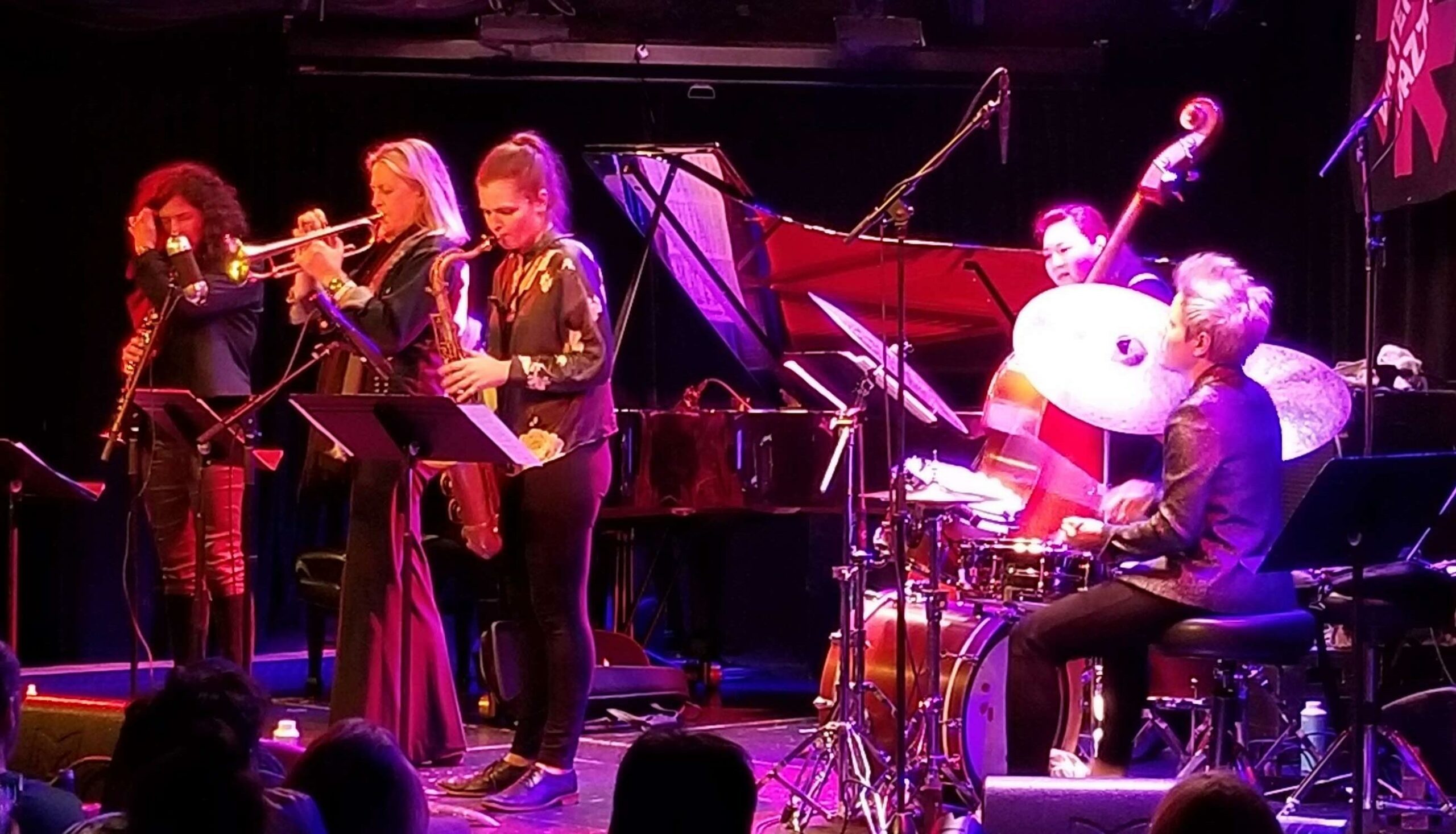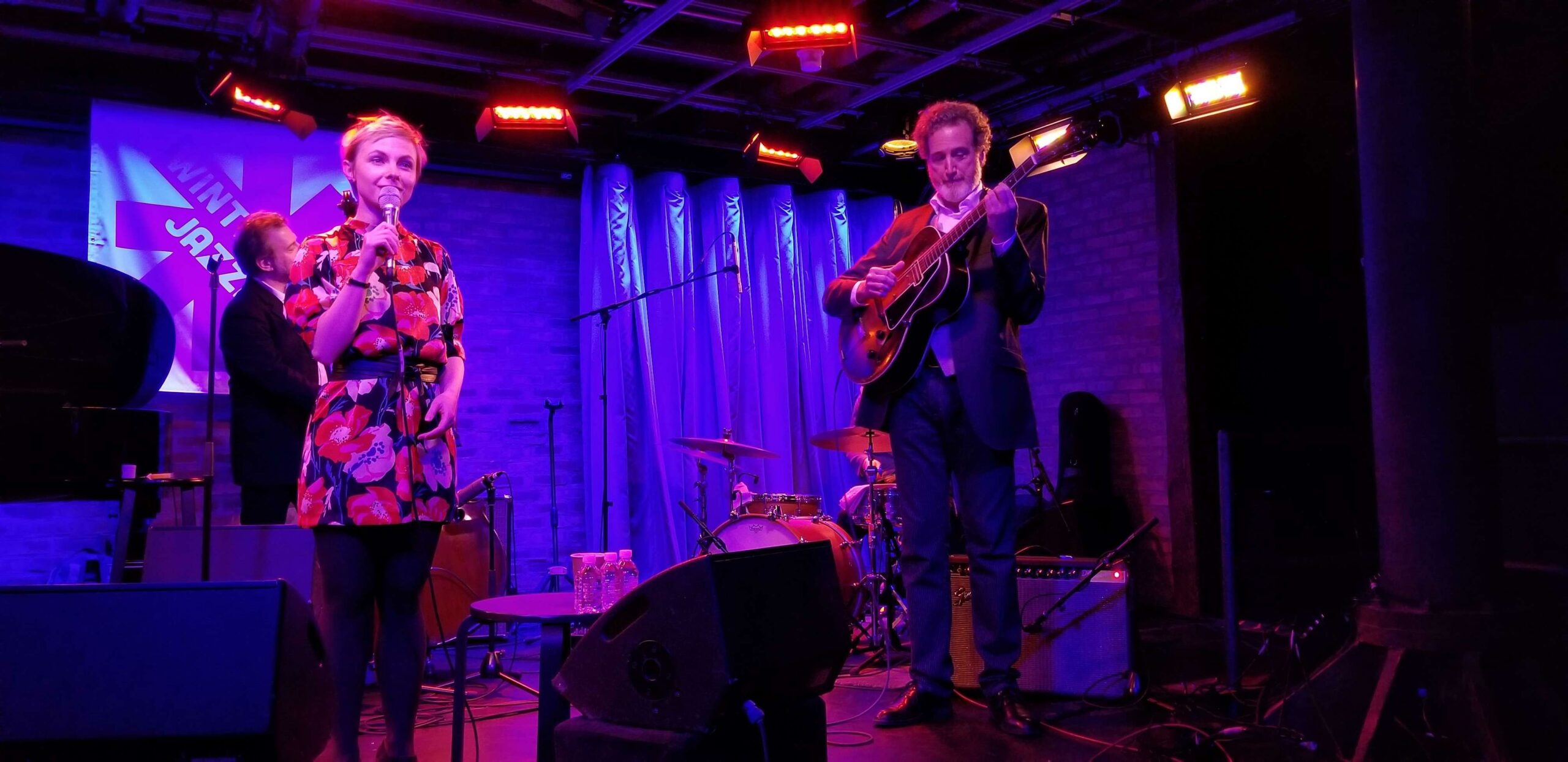Features
Sax Appeal: Gender, Jazz & New Voices at NYC’s Winter Jazzfest & Congress

(Phil Gallo) –
Artemis performs at Le Poisson Rouge during the 2020 Winter Jazzfest. From left, Anat Cohen, Ingrid Jensen, Nicole Glover, bassist Noriko Ueda and drummer Allison Miller (Not pictured: pianist Renee Rosnes.)
Women don’t need jazz, but jazz needs women.
That sentence emerged at the Jazz Congress conference at Jazz @ Lincoln Center during a keynote conversation led by Kaisha S. Johnson, Founding Director of Women of Color in the Arts and would carry weight throughout a week when the jazz world descends on New York City. Welcoming and celebrating women in jazz was central to New York City’s 2020 Jazz Congress and the Winter Jazzfest, which was rife with creative, inspiring and disparate sounds and this year included many female-led bands from the all-women sextet Artemis to celebrated pianist Kris Davis to star-in-the-making Lakecia Benjamin and more.
One of the great things about Winter Jazzfest, which ran Jan. 8-18 and included an increased presence in Brooklyn, is seeing musicians work as leaders or side-persons, sometimes sitting in for a one-off gig or performing with a leader they often call boss. It felt, this year, that more women were moving more fluidly from band to band—trumpeter Jaimie Branch led her own group one night and performed in six other ensembles; the drummer Allison Miller led her Boom Tic Boom as an opening act for the group she also drums in, Artemis.

(Phil Gallo) –
Kat Edmonson premiered songs from her “Dreamers Do” album at Subculture with her quartet featuring guitarist Matt Munisteri.
Similarly, no matter who was on the stage, there was a sense composition was as important as improvisation. Naturally, each attendee will have a different experience — there are 17 individual shows and three Marathons nights: two nights, 10 venues, more than 100 acts in Manhattan; one night, six venues, 28 acts in Brooklyn. In my experience, nothing resembled the standard head-solo-head performances that has dominated mainstream jazz since the 1950s nor the free-blowing sessions that defined the avant-garde in the late 20th century.
Even a more traditional singer such as Kat Edmonson creatively arranges her originals and covers of mid-‘60s movie tunes to break free of older regimented styles and yet remains connected to the tradition. (Edmonson, whose old-fashioned pop would work seamlessly with the soundtrack of “The Marvelous Mrs. Maisel,” debuted songs from her upcoming album Dreamers Do; she starts a 40-date tour Feb. 13 in Santa Fe, N.M.)
Kris Davis performed the music from Diatom Ribbons, which topped the NPR Jazz Critics Poll and New York Times best of 2019 jazz list, with a quintet featuring saxophonist Tony Malaby and drummer Terri Lyne Carrington plus a guest vocal spot from Esperanza Spalding. Davis is among the few drawing lines from the older avant garde of Cecil Taylor into funk and the use of electronics with a dab of minimalism; she often utilizes stark piano figures, some reduced to a couple of notes, that her musicians swirl around with melodies and improvisations. Her compositions are among the most challenging in jazz today.

(Phil Gallo) –
Lakecia Benjamin leads a tribute to John and Alice Coltrane at Le Poisson Rouge.
If a star emerges from Winter Jazzfest it could well be the alto saxophonist Lakecia Benjamin. Jazz festivals looking to book a charming performer capable of captivating the masses and appealing to the serious-minded fans need look no further. Known for balancing hip-hop and R&B with straight-ahead jazz work, Benjamin switched gears and dove deep into the music of John and Alice Coltrane in her set at Le Poisson Rouge, debuting music from her Coltrane project, Pursuance, that comes out in March.
Benjamin emphasized the spiritual elements of both Coltranes, swinging hard and pushing her instrument to its low register boundaries while working with a band that included legends as guests: Reggie Workman, a bassist who worked with both Coltranes, violinist Regina Carter and saxophonists Greg Osby and Marcus Strickland. Her energy and skill are joys to watch and the joy she expresses is addictive.
Brice Rosenbloom and his programming team wisely booked a collection of top-drawer headliners — the teen piano sensation Joey Alexander, trumpeter Ambrose Akinmusire,. who records for Blue Note and International Anthem drummer Makaya McCraven — in the biggest of the fest’s 11 venues for the opening night of the Manhattan marathon.
Alexander, whose debut for Verve will be released Jan. 31, continues to show the sort of growth that proves his emergence at the age of 12 was no fluke. (He has already released five albums on the indie Motema label). His fiery interpretation of Joe Henderson’s “Inner Urge” and the originals that will appear on the next album, Warna, reveal a blossoming assertiveness in his playing — think McCoy Tyner in the mid-’70s — and a giving spirit for interplay with his bassist and drummer.
Interplay, as always, are trademarks of Akinmusire, easily the most adventurous musician to ever win the Thelonious Monk competition, and McCraven, who has fast become a go-to bandleader for the modern experimental artists. Akinmusire’s set was packed with his own assured playing but left room for some outstanding work from the drummer Justin Brown and pianist Sam Harris, who bounced between the floral and jagged. (Over the weekend of Jan. 11-12, Akinmusire started recording his next album).
McCraven’s invigorating two-song, 40-minute set showcased the considerable skills of vibraphonist Joel Ross as they worked through the soulfully gorgeous “In These Times.” An extended reading of his “Atlantic Black” felt like the four seasons compacted into a half-hour: the spirit of spring blooming from the hands of harpist Brandy Younger; the bounce of summertime fun found in a give and take between bassist Junius Paul, McCraven and Ross; autumnal bliss from tenor man Irvin Pierce and trumpeter Marquis Hill; and a wintry storm from the septet in free-form blast. Later in the week, drummer Brown and vibist Ross were part of the impressive sextet bassist Harish Raghavan assembled to perform his intricate compositions driven by challenging interplay.
The audiences at these shows get it, too: They applaud ensemble passages as much as solos, appreciating the musicians’ ability to act as a single unit and not just virtuosos. Winter Jazzfest, too, shows much the music is pulling from outside forces, especially hip-hop and various Latin forms. The question now is, can the presenters who fill Jazz Congress find a way to embrace the stars of Winter Jazzfest and build attentive audiences for the Joey Alexanders and Artemises and McCravens across America.
“I don’t know the last time I toured the South,” pianist Orrin Evans said a day after he debuted his duet project with former “Tonight Show” guitarist Kevin Eubanks at le Poisson Rouge. (They have an album on the books for fall). “We have to figure out how to get into these markets.”
Evans, who also leads his own bands and replaced Ethan Iverson in the Bad Plus, was speaking as a Jazz Congress sessions exploring the use of grants, specifically South Arts’ Jazz Road, to develop audiences for jazz outside clubs and PACs in major cities. The key is to help arts presenters that don’t currently present jazz.
The grants, Unlimited Myles booking agent Rory Trainor said, “give venues some breathing room to take risks…and build trust with audiences by presenting quality music.”
At sessions dedicated to women, though, the common word was “more.” More educational opportunities for girls, more women teachers, more female presenters and promoters, more chances for girls and young women to perform together during their formative years, more openness to instrument choices beyond piano, violin, sax, more celebrations of women jazz artists and their works, etc.
“After 100 years, having women play is not a novelty,” said Monika Herzig, pianist and leader of the band SHEROES. “We’re taught you have to be better than everyone else [to get a job with a band]. That tokenism is not healthy and I hope we’re not having this same conversation 10 years from now.”